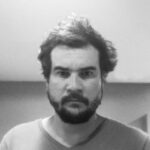Co-founder of the Gávea Arquitetos office, located in Rio de Janeiro, since 2007. He has experience participating in various architecture competitions, with a highlight being the award received at the 48th Annual IAB Awards with the project ‘Casa do Artista Quando Jovem’ in 2010.
He graduated as an architect in 2002 from the Faculty of Architecture and Urbanism at UFRJ and completed a postgraduate degree in ‘History of Art and Modern Architecture in Brazil’ at PUC-Rio. In 2017, he obtained a Master’s degree in Urbanism from the Postgraduate Program in Urbanism at UFRJ. Among his academic experiences, it is worth mentioning his time as a substitute professor at the Faculty of Architecture and Urbanism at UFRJ from 2011 to 2013 and from 2015 to 2017, where he taught various disciplines in the Design Department. Currently, he is a member of the faculty at the Department of Architecture and Urbanism at PUC-Rio, holding the position of adjunct professor, where he teaches the Collective Space Design course [4th semester].


